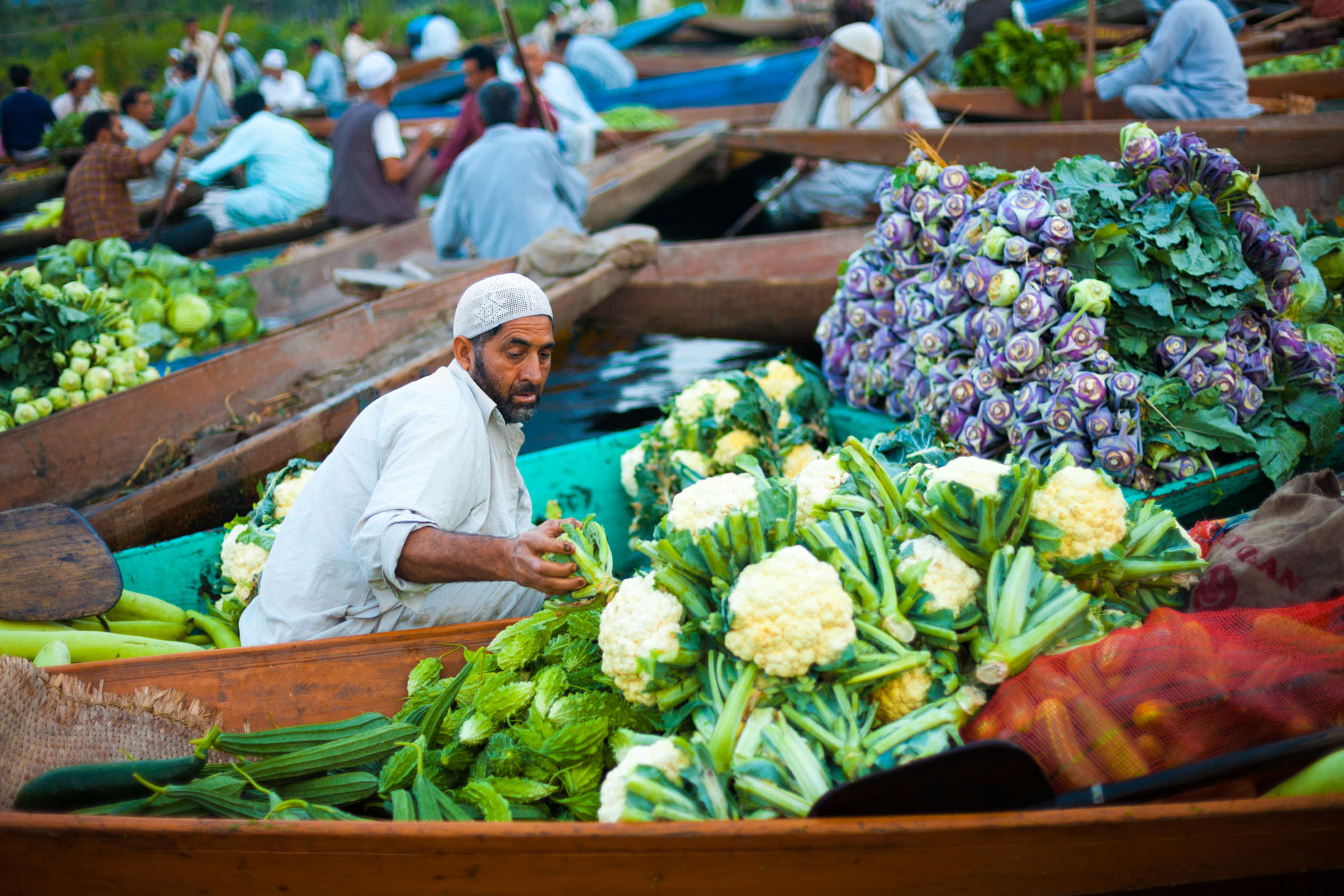

0


0
ART AND CULTURE
By Banani
24 March, 2017

 The formation of floating gardens: The growing of vegetables in the lake is a tedious job which demands a lot of hard work. The first step is to correctly lay down the weeds. The floating gardens have a base of two types of weeds namely Pech (Typha angustata) and nargasa (Phragmites australis) with an addition of pruned weeds which gets converted into a thick raft within a span of almost 3 years. Once the bed is ready, they are all set to get cultivated. Depending on the type of vegetables grown, the floating gardens have been divided into two namely, raadh and demb. Vegetables like tomatoes, melons, pumpkin, and cucumber are grown in the mobile floating garden-raadh, whereas the static part of the floating gardens, “demb” comprises of turnip, radish, carrot, green leafy vegetables during winter and melons, tomato, cucumber and pumpkin during the summer season. For people who follow “Organic” Dal is the perfect place to offer the freshly grown organic vegetables and fruits.
The formation of floating gardens: The growing of vegetables in the lake is a tedious job which demands a lot of hard work. The first step is to correctly lay down the weeds. The floating gardens have a base of two types of weeds namely Pech (Typha angustata) and nargasa (Phragmites australis) with an addition of pruned weeds which gets converted into a thick raft within a span of almost 3 years. Once the bed is ready, they are all set to get cultivated. Depending on the type of vegetables grown, the floating gardens have been divided into two namely, raadh and demb. Vegetables like tomatoes, melons, pumpkin, and cucumber are grown in the mobile floating garden-raadh, whereas the static part of the floating gardens, “demb” comprises of turnip, radish, carrot, green leafy vegetables during winter and melons, tomato, cucumber and pumpkin during the summer season. For people who follow “Organic” Dal is the perfect place to offer the freshly grown organic vegetables and fruits.
 The early morning floating market on Dal Lake in Srinagar, Kashmir, Jammu and Kashmir State, India.
Risk to the lives: With all the advantages of this lake, Dal has its dark side too. The risk of life-threatening diseases to all the living organisms in the ecosystem has been increasing from quite a long time. The lake is now getting converted into a swamp with the increasing pollution. The presence of the beautiful houseboats, hotels with their respective wastage dumped into the lake has led the scenic Dal Lake looks like a slum on the lap of a river.
Various chemical tests have been done which proved the presence of toxic chemicals like arsenic, lead, manganese, copper and cadmium in high levels. These not only harm the aquatic flora like fishes but also in turn affecting the humans adversely. It’s not only the houseboat owners and the hotels but also the usage of fertilizers by the farmers in the floating garden act as the major contributors in making the Dal Lake, a swamp.
Necessary Steps taken: The government has started implementing several techniques to maintain the health of the Dal Lake. They have put machines in the lake for algae extraction, however, those machines are not able to uproot the plants which grow back again in no time. This is when the farmers came into existence, cutting the plants with their roots off and using it as organic manure in their own gardens. This is one of a kind of step taken to keep the lake clean and the farmers can follow the sustainable yet healthy way of cultivation.
The early morning floating market on Dal Lake in Srinagar, Kashmir, Jammu and Kashmir State, India.
Risk to the lives: With all the advantages of this lake, Dal has its dark side too. The risk of life-threatening diseases to all the living organisms in the ecosystem has been increasing from quite a long time. The lake is now getting converted into a swamp with the increasing pollution. The presence of the beautiful houseboats, hotels with their respective wastage dumped into the lake has led the scenic Dal Lake looks like a slum on the lap of a river.
Various chemical tests have been done which proved the presence of toxic chemicals like arsenic, lead, manganese, copper and cadmium in high levels. These not only harm the aquatic flora like fishes but also in turn affecting the humans adversely. It’s not only the houseboat owners and the hotels but also the usage of fertilizers by the farmers in the floating garden act as the major contributors in making the Dal Lake, a swamp.
Necessary Steps taken: The government has started implementing several techniques to maintain the health of the Dal Lake. They have put machines in the lake for algae extraction, however, those machines are not able to uproot the plants which grow back again in no time. This is when the farmers came into existence, cutting the plants with their roots off and using it as organic manure in their own gardens. This is one of a kind of step taken to keep the lake clean and the farmers can follow the sustainable yet healthy way of cultivation.
 Formation of algae in the lake
Formation of algae in the lake
This floating garden is the zipline between the rising expenses and sustainable livelihood for the inhabitants. Most of the families in Kashmir are dependent on these floating gardens to feed themselves and their children. During hard times, viz, curfews which are the daily and common talks of the town, the floating markets are the only hope for the inhabitants of Srinagar. Hence, it won’t be good if this heritage oozes out from the Mother Nature. Let’s save it so as to preserve for our future generation. Source: Mint Lounge